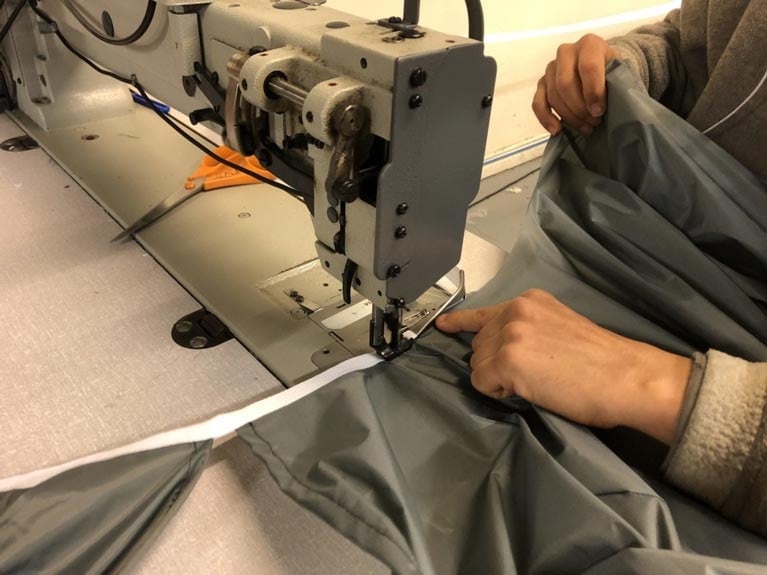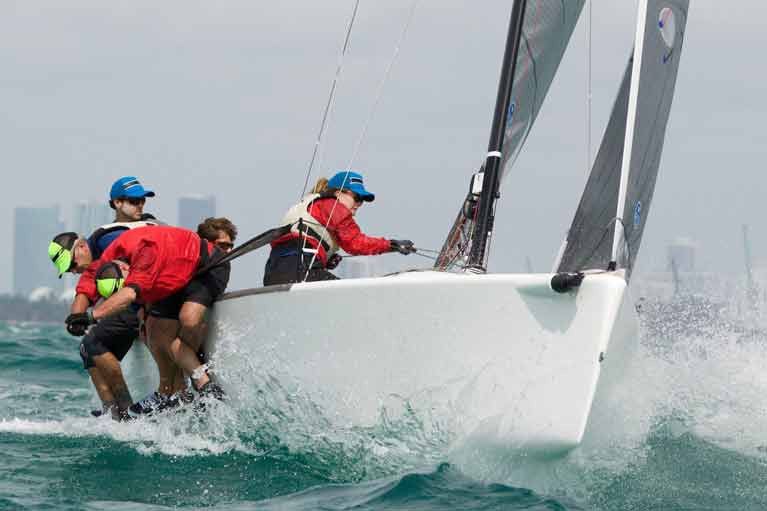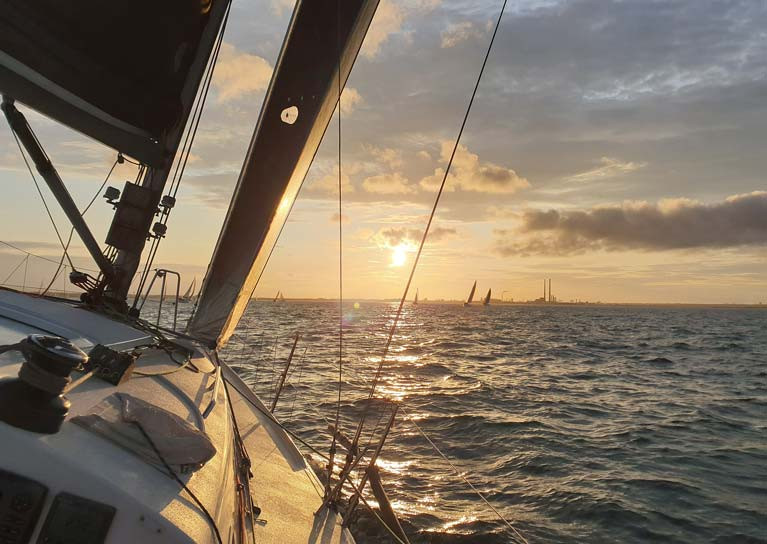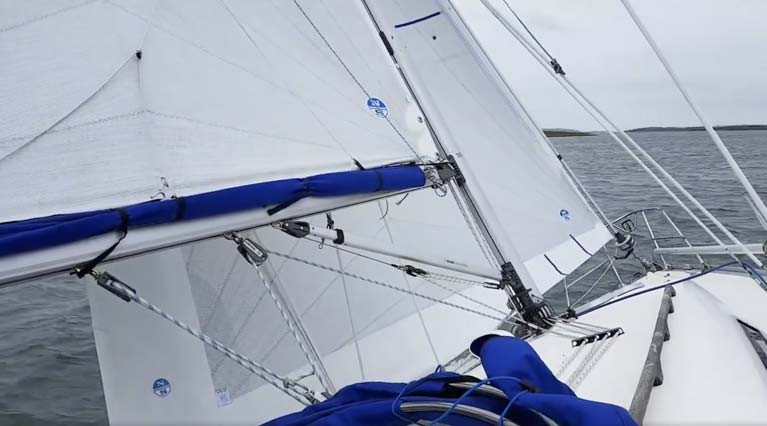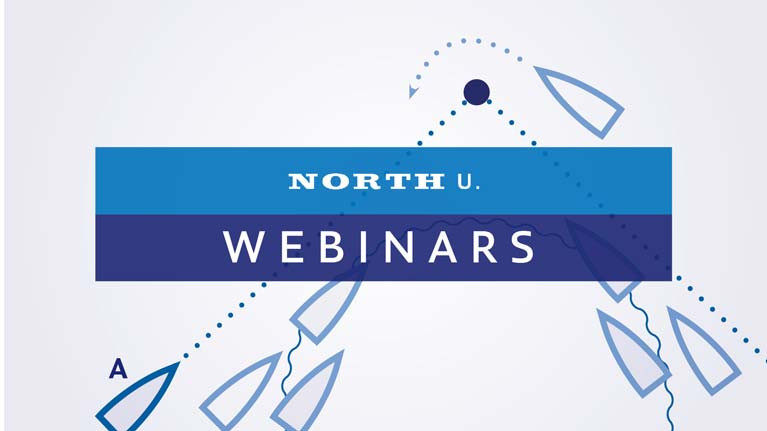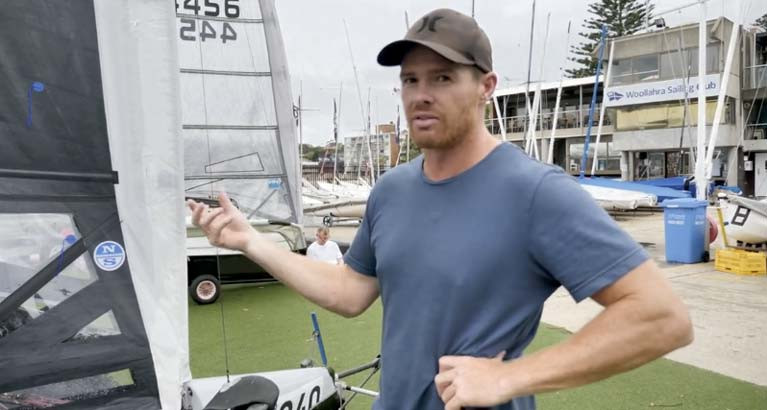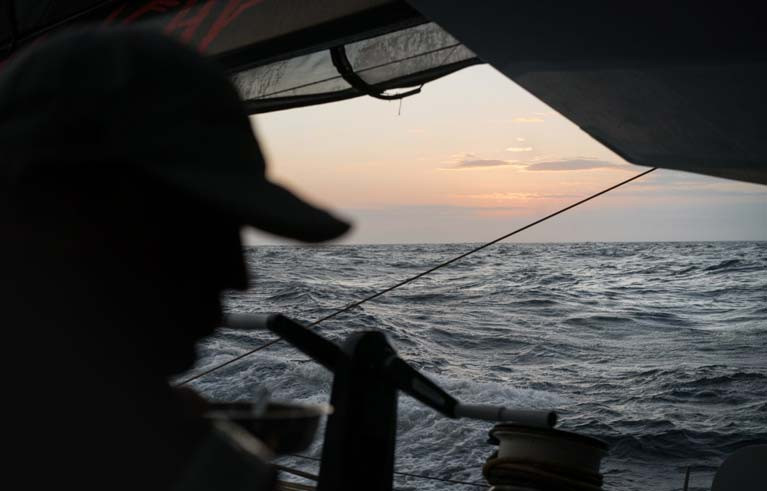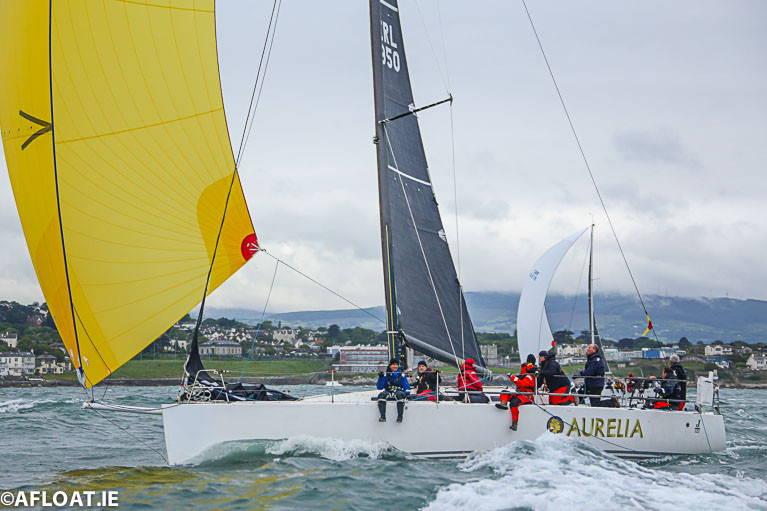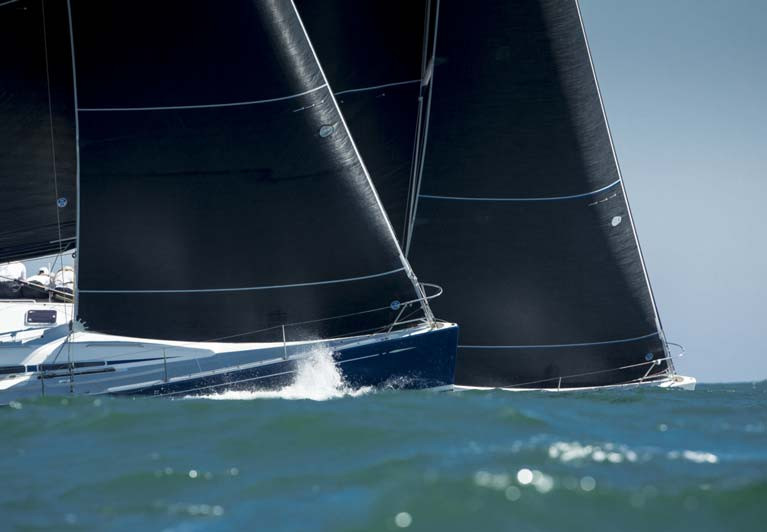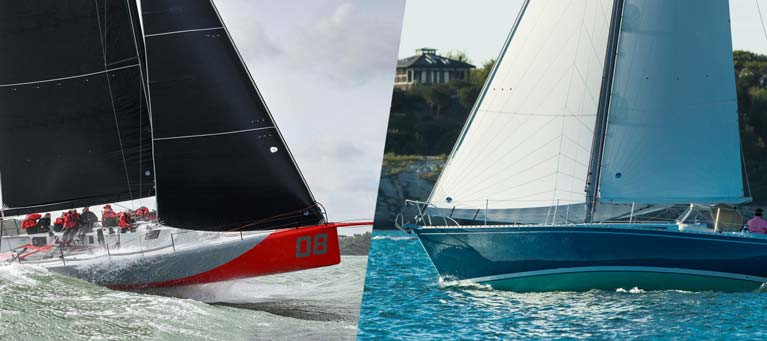Displaying items by tag: North Sails Ireland
Richard Marshall and his Cork Harbour company Marshall Marine Textiles are the Service Arm of North Sails Ireland.
Richard has been at the forefront of PPE supplies to the HSE and is currently working flat out with his small Team in Cobh.
The work is very specialised as you might imagine and he has invested in some specialist machinery to improve the efficiency of the production.
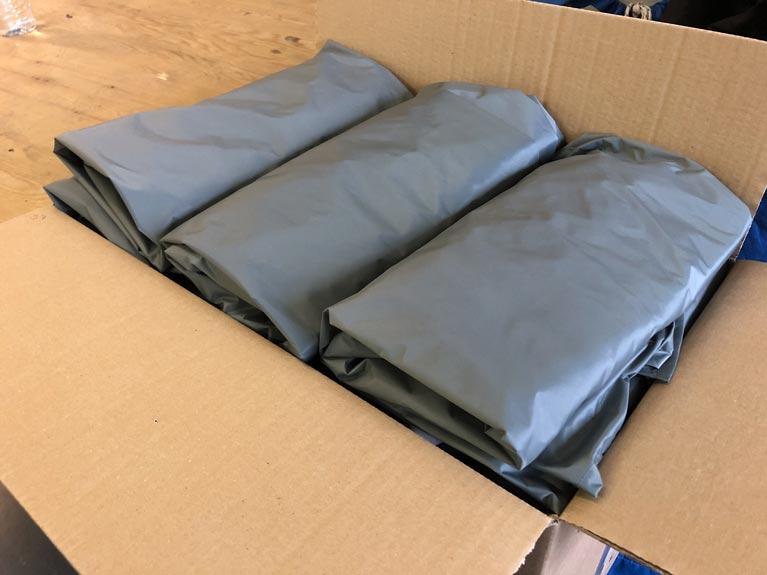 Boxed and ready to go - Marshall Marine gowns boxed for the front line fight against COVID-19
Boxed and ready to go - Marshall Marine gowns boxed for the front line fight against COVID-19
Right now they are working on an order for over 5000 gowns for the front line and he has already supplied masks, face shields and now they are working on the second large batch order of gowns.
Earlier in the week Richard and the team passed the 10,000 mark in items supplied and here at North Sails Ireland we could not let that go past without celebrating the news.
Thanks, Richard and team for your excellent work and commitment to the cause. You guys are making a difference!
Link to our North Sails Ireland tribute here
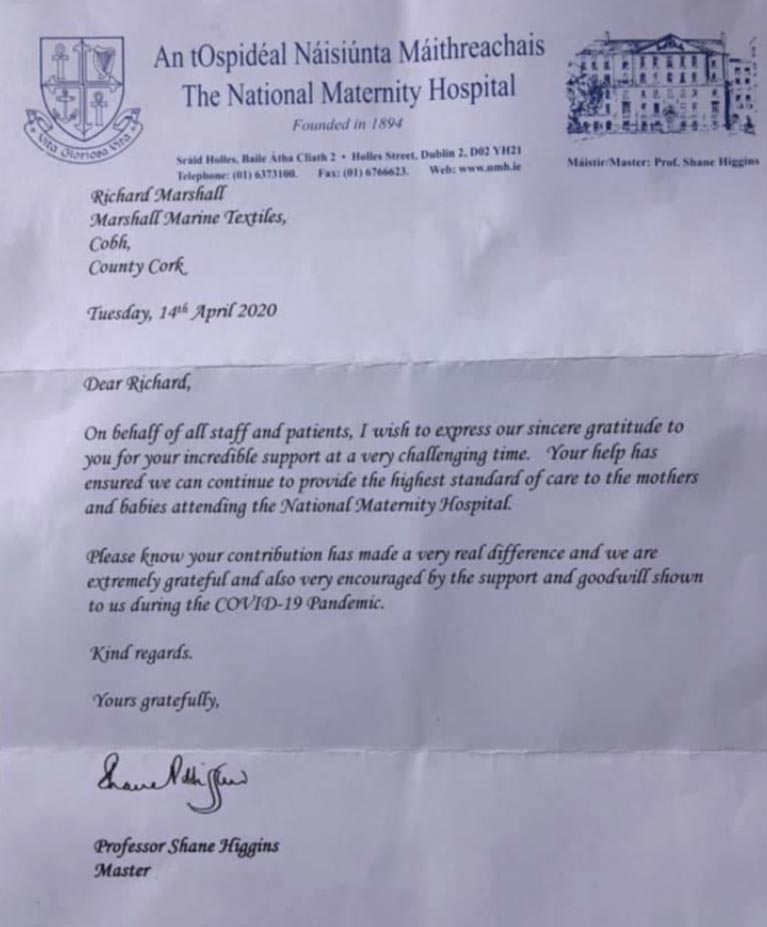 A Thank you letter Richard Marshall received from the Master of the National Maternity Hospital
A Thank you letter Richard Marshall received from the Master of the National Maternity Hospital
Our North Sails Melges 24 "Upwind Sail Trim" webinar will be on tonight, Monday, April at 8 pm. I am really looking forward to re-connecting with this great class and it also gave me a misty-eyed reason to review these epic "Embarr" upwind pics!
Joining me on the webinar will be John Bowden (North Sails USA), Giulio Desiderato (North Sails Italy) and special guest Mike Buckley (Stars & Stripes America's Cup Challenge CEO and "Monsoon" tactician) where we will be discussing all things upwind on this fantastic boat.
Register and webinar details here - all welcome!
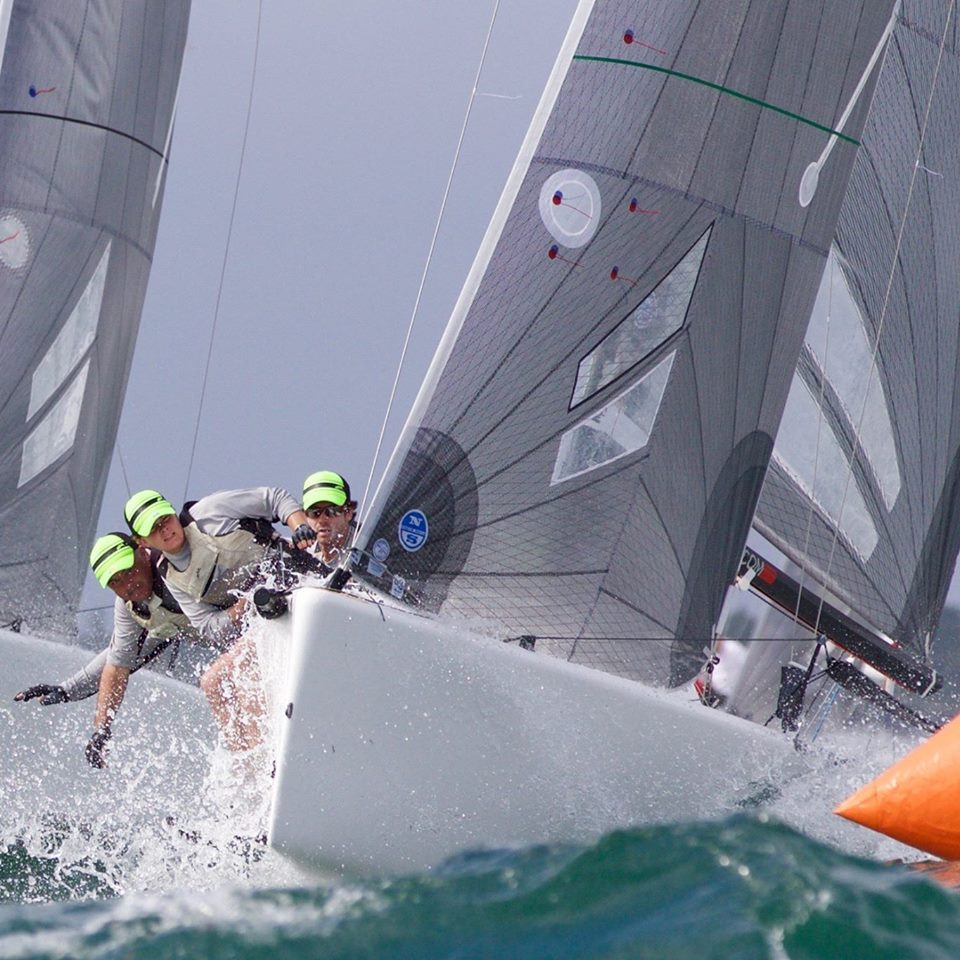 The winning Embarr crew, including Maurice O'Connell, at the Melges 24 World Championships
The winning Embarr crew, including Maurice O'Connell, at the Melges 24 World Championships
North Sails Master Class in Offshore Sailing
Here at North Sails Ireland, we are delighted to see our offshore racing community responding proactively to the Cv19 pandemic. The Round Ireland race that's been rescheduled to Aug 22nd will be a highlight in the calendar! Fingers crossed that we will have the environment to allow it to go ahead come August. We are also hoping that a late-season ISORA programme may be possible.
Speaking of offshore racing, here is a real gem for Irish offshore sailors.............from our homes to yours, North Sails invites you to join us and our all-star line up for a master class in offshore sailing on Wednesday, April 22 at 9 pm GMT.
North Sails President, Volvo race veteran and industry-opinion leader, Ken Read, will host a discussion with 11th Hour Racing Team skipper Charlie Enright, and offshore veterans Rob Greenhalgh and Alberto Bolzan. You can only catch this expert group in one place.
Please register today and tune in to this exclusive talk for insights and take away expert tips from the best in sailing.
Sign up here: https://bit.ly/3bqO8As
From your team at North Sails Ireland - enjoy it and best wishes to everyone!
Here at North Sails Ireland, a large portion of our customer base is made up of a wide range of cruising sailors writes Maurice O'Connell.
They range from blue-water sailors who have circumnavigated the globe to coastal sailors who undertake short "hops" with friends and family.
Cruising sailors' requirements can be a little different from our "all-out" racing clients. Here at North Sails, we have an extensive range of cruising products that will deliver fast, reliable cruising for many many years.
Have you ever wondered about, "what should I be looking for in a cruising sail?". Well, here's the answer...North Sails invites all sailors to join our "10 Things To Look For In Cruising Sails" webinar.
This fun and informative webinar will be hosted by our colleagues Bob Meagher, Peter Grimm (North Sails Fort Lauderdale) and Austin Powers (North Sails Annapolis).
Read about them here:-
https://www.northsails.com/sailing/en/experts/peter-grimm-jr
https://www.northsails.com/sailing/en/experts/bob-meagher
https://www.northsails.com/sailing/en/experts/austin-powers
All are welcome to our webinar...........
With very best wishes from North Sails Ireland.
Please register here
Tune into North Sails Webinars
Our North Sails Moth webinar last week was a great success with "Mothies" from all over the world tuning in - including Irish Moth sailors from around the country!
The upcoming North Sails Webinar schedule can be found here
We'd love to see as many of you as possible clicking in to join in these fun and informative sessions.
North Sails Moth Masterclass From Rob Greenhalgh & Tom Slingsby (Worth Watching, No Matter What Boat You Sail!)
Tom Slingsby has won Olympic gold and numerous world titles in the Laser class. He has won the America's Cup as strategist with Team Oracle USA.
Last December, he flew his North Sails 3Di mainsail in a never seen before domination of the Moth World Championship
Rob Greenhalgh, now based in Sydney, is our North Sails Moth specialist. He himself has won numerous national and international titles (including the 2004 1720 Europeans!) and indeed represented Ireland as a member of Anthony O'Leary's "Antix" team in the 2008 Rolex Commodore's Cup. Rob is veteran of five Volvo Ocean races and was a member of the winning team in the 2005/6 edition on "ABN Amro 1".
North Sails Wins 2019 Irish Moth Nationals
Closer to home, Alistair Kissane from Howth Yacht Club (pictured below) won the 2019 Irish Moth nationals in Baltimore Sailing Club flying his North Sails Vi-8LA 3Di mainsail.
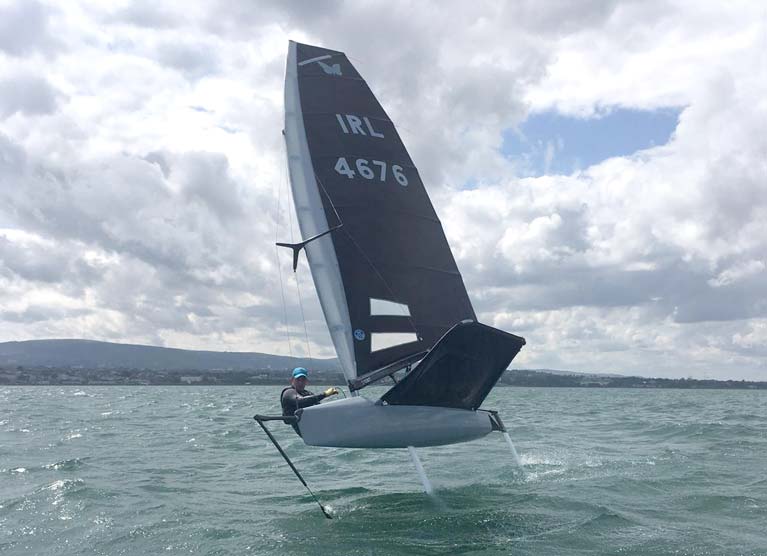 Alistair Kissane flying North Sails 3Di to win the 2019 Irish Moth Nationals in Baltimore SC
Alistair Kissane flying North Sails 3Di to win the 2019 Irish Moth Nationals in Baltimore SC
Please click on the link here to watch a fascinating North Sails video, narrated by Rob with special guest Tom Slingsby, on the technical aspects of setting up the new North Sails Vi-9DSX Moth sail and rig. No matter what boat you sail, this is well worth watching!
Join North Sails Moth Class Leader, National and European titleholder Rob Greenhalgh for the first of many live webinars, on Wednesday, March 25th at 8:00 pm GMT, register here
From all of us here at North Sails Ireland - stay safe and well.
North Sails Ireland: How to Remain Focused Racing Offshore
Offshore Sailing Guru Casey Smith shares his thoughts on how to remain focussed during long periods at sea in this latest North Sails article. When we get back to racing later in the season this could be really helpful for all of the ISORA and Round Ireland racers looking to up their game.
Day after day, mile after mile, distance racing reminds us of that never-ending feeling of being stuck in one place for extended periods of time. Hear more from Casey Smith (CS) how to cope with those long periods of isolation where you can only do so much. Casey is a two-time Volvo Ocean Race veteran and was a key member onboard during all of Comanche’s record runs and race wins. Casey knows a lot about being stuck out at sea, but still finds humour in the little things and gets his job done, which is most important.
We hope you enjoy the read here
North Sails Ireland - Let's Stay Connected
Greetings to all our North Sails Ireland sailing friends at home here in Ireland and around the world.
All of us are passionate about sailing and we can keep a calm head afloat when things get serious. Please join us in bringing that mindset into our lives on land these coming days and weeks. It is a tough time for us all. Stay connected everyone!
We will continue to provide you with customer service via the phone, text, email, Whatsapp or virtual meetings. Most of us are working remotely and ready to answer your questions and support you where possible.
We are preparing a schedule of content for you based on a variety of topics - cruising, technical topics, videos etc. We hope that you may find these interesting while we await getting back out on the water.
Our US colleague, Tom Davis, penned this informative piece about "What to Look for and How to Prolong the Life of the Material" in your spinnaker and ultimately when to replace it. We hope you like it. Click to read it here
From us all here at North Sails Ireland - stay safe and well, both mentally and physically.
Why are Racing Sails Black?
North Sails have been the market leader in sail technology for as long as I have been sailmaking, and that's a couple of years now! (started back in 1981). When a company like North Sails comes up with something new, the majority of the other sailmakers tend to try and follow. They cannot match the technology, so what's next? At least they can copy the colour!
Back in the '90s when 3DL was the leading race product with clear mylar films the sails were see-through. Then North Sails changed the film colour to a dark grey and the world followed, it took some time but the switch happened. The next step was to black mylar films and they all followed again......each time it took a while but eventually the market shifted to follow the leader.
When North Sails introduced 3Di sails roughly 10 years ago the look of sails changed dramatically to a matt black and this has continued across the majority of the North race product line today.
What we are now seeing in the race market is almost 100% Black sails.........North Sails are black for a reason, most of the others are only black to follow the leader with zero benefits to the client.
See what Per Anderson the head of 3Di development has to say on the subject here
What is The Difference Between Racing & Cruising Sails?
North Sails colleague and friend Neil Mackley has just written a really nice piece on the difference between racing and cruising sails that I wanted to share with Afloat readers writes Nigel Young of North Sails Ireland
Neil has been with North Sails since 1982 and as you might imagine knows a thing or two about sails...
Before I started North Sails Ireland in 2004 Neil was a regular visitor to Ireland looking after the clients here at that time. Neil attended the first few ICRA conferences with me when we were starting out here in Ireland and his experience in the industry is second to none. He can still be seen in Ireland often sailing with Nigel Biggs and the Half Ton fleet.
My own sailmaking career started in 1981 so we have seen all the industry changes together since that time. The big difference is that Neil was with North Sails for the full 38 years and I have been with three lofts, joining North Sails in 1994.
I hope you enjoy the article here and please do not hesitate to contact us with any questions you may have.


























